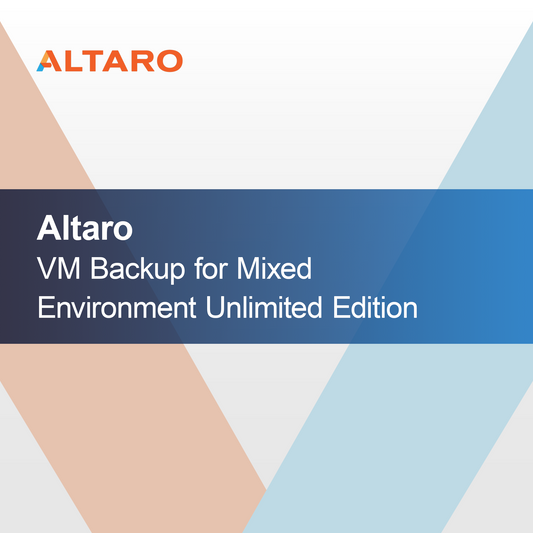-
Aiseesoft iOS Data Backup & Recovery
Regular price From $82.00Sale price From $82.00 Regular priceUnit price perAiseesoft iOS Backup & Restore With Aiseesoft iOS Backup & Restore, you can easily and securely save your important data such as photos, contacts, and messages....
-
Altaro VM Backup for Mixed Environment Unlimited Edition
Regular price $1,359.00Sale price $1,359.00 Regular priceUnit price perAltaro VM Backup for Mixed Environment Unlimited Edition With the license for Altaro VM Backup for Mixed Environment Unlimited Edition, you get a powerful and user-friendly...
Data backup
Why is data backup important?
Data backup is a crucial process to protect your valuable information from loss. Unexpected events such as hardware failures, software issues, or cyberattacks can lead to data loss, which can have serious consequences. By performing regular backups, you ensure that your data can be restored in case of a problem. This is especially important for businesses that rely on their data to maintain operations.
What methods of data backup are there?
There are various methods for data backup that can be used depending on the need. These include local backups on external hard drives, network storage, or cloud-based solutions. Each method has its advantages and disadvantages. Local backups offer quick access, while cloud solutions provide greater flexibility and security since the data is stored in an external location. It is advisable to use a combination of several methods to ensure the best protection.
How often should I back up my data?
The frequency of data backup depends on the type of data and its usage. For business-critical data, it is recommended to perform daily backups, while less important data can be backed up weekly or monthly. Automated backup solutions can help simplify the process and ensure that no backup is forgotten. Regular checks of the backups are also important to ensure that the data can be restored in an emergency.
What should I consider when choosing a backup solution?
When choosing a backup solution, you should consider several factors. These include storage capacity, user-friendliness, data security, and cost. Make sure the solution is regularly updated and offers good customer support. It is also important that the backup solution is compatible with your existing systems to ensure a smooth process.
- Local backups for quick access to data
- Cloud backups for additional security and flexibility
- Automated backups to avoid human errors
How can I restore my data in an emergency?
The recovery of your data in an emergency depends on the backup method you have chosen. For local backups, you can simply restore the data from the external hard drive or network storage. For cloud backups, you need to log into your account and download the desired data. It is advisable to regularly test the recovery processes to ensure that you can act quickly and efficiently in an emergency.
What security measures should I take for my backups?
To protect your backups, you should take various security measures. This includes encrypting the data to prevent unauthorized access. You should also ensure that your backup solutions are regularly updated to close security gaps. It is also advisable to store backups in multiple locations to minimize the risk of simultaneous loss. A comprehensive security strategy effectively protects your data.














